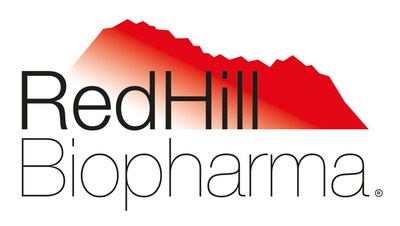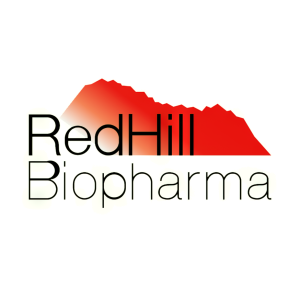RedHill and U.S. Army Announce Opaganib's Ebola Virus Disease Survival Benefit in U.S. Army-Funded In-Vivo Study
- RedHill Biopharma's opaganib shows activity in Ebola virus disease, increasing survival time in a U.S. Army study. Opaganib also demonstrates antiviral benefit in COVID-19 studies.
- None.
Insights
Analyzing...
- Novel, oral opaganib, delivered a statistically significant increase in survival time (at 150 mg/kg BID) in a
- Opaganib is believed to be the first host-directed molecule to show activity in Ebola virus disease, having previously shown in vitro benefit in several strains of Ebola virus disease models
- Twice daily administered opaganib has previously demonstrated antiviral benefit in late-stage clinical studies of patients hospitalized with moderate to severe COVID-19; opaganib was also selected by the NIH Radiation and Nuclear Countermeasures Program (RNCP) for Acute Radiation Syndrome development

Rekha Panchal, Ph. D of USAMRIID, who led the study, said: "These results represent an alternative strategy of using a host-directed therapeutic with activity in Ebola virus disease in-vivo. Given the unmet medical need and the untapped potential of host-directed antivirals, these results with opaganib, an easy to distribute and administer oral small molecule drug, support its further investigation for use in treating Ebola."
The
"We believe opaganib is the most advanced sphingosine kinase-2 (SPHK2) selective inhibitor in clinical development, and the more we learn about this molecule, its novel host-directed mechanism of action, and its growing safety and tolerability database, the more promising it appears," said Reza Fathi, PhD, RedHill's SVP R&D. "Opaganib has shown its host-directed antiviral potential in clinical and non-clinical studies, warranting further investigation in Ebola and other infectious viral diseases. Working through the inhibition of multiple pathways, anti-inflammatory properties, the induction of autophagy and apoptosis, and disruption of viral replication and potential inhibition of cell entry via simultaneous inhibition of three sphingolipid-metabolizing enzymes in human cells (SPHK2, DES1 and GCS), we believe opaganib offers a potential breakthrough for fighting a virus capable of causing devastating outbreaks of disease in the countries least equipped to cope with them."
Twice daily administered opaganib has previously demonstrated antiviral benefit in late-stage clinical studies of patients hospitalized with moderate to severe COVID-19 and was selected by the NIH Radiation and Nuclear Countermeasures Program (RNCP) for Acute Radiation Syndrome development.
About Ebola virus disease:
According to the Centers for Disease Control and Prevention (CDC), Ebola disease is a rare and often deadly illness, caused by infection by one of a group of four viruses, known as ebolaviruses, that are found primarily in sub-Saharan Africa and are known as:
About Opaganib (ABC294640)
Opaganib, a proprietary investigational host-directed and potentially broad-acting drug, is a first-in-class, orally administered sphingosine kinase-2 (SPHK2) selective inhibitor with anticancer, anti-inflammatory and antiviral activity, targeting multiple potential diseases, including gastrointestinal acute radiation syndrome (GI-ARS), COVID-19, other viruses as part of pandemic preparedness, and cholangiocarcinoma (bile duct cancer).
Opaganib's host-directed action is thought to work through the inhibition of multiple pathways, the induction of autophagy and apoptosis, and disruption of viral replication, through simultaneous inhibition of three sphingolipid-metabolizing enzymes in human cells (SPHK2, DES1 and GCS).
Opaganib was recently selected by the
Opaganib has received Orphan Drug designation from the FDA for the treatment of cholangiocarcinoma and has undergone studies in advanced cholangiocarcinoma (Phase 2a) and prostate cancer. Opaganib also has a Phase 1 chemoradiotherapy study protocol ready for FDA-IND submission.
Opaganib has demonstrated antiviral activity against SARS-CoV-2, multiple variants, and several other viruses, such as Influenza A. Being host-targeted, and based on data accumulated to date, opaganib is expected to maintain effect against emerging viral variants. In prespecified analyses of Phase 2/3 clinical data in hospitalized patients with moderate to severe COVID-19, oral opaganib demonstrated improved viral RNA clearance, faster time to recovery and significant mortality reduction in key patient subpopulations versus placebo on top of standard of care. Data from the opaganib global Phase 2/3 study has been submitted for peer review and recently published in medRxiv.
Opaganib has also shown positive preclinical results in renal fibrosis, and has the potential to target multiple oncology, radioprotection, viral, inflammatory, and gastrointestinal indications.
About USAMRIID
Since 1969, USAMRIID has served as the Department of Defense's (DoD) lead laboratory for medical biological defense research. The core mission is to protect the warfighter from biological threats, while also investigating disease outbreaks and threats to public health. Research conducted at USAMRIID leads to medical solutions—therapeutics, vaccines, diagnostics, and information—that benefit both military personnel and civilians. USAMRIID is a subordinate laboratory of the
About RedHill Biopharma
RedHill Biopharma Ltd. (Nasdaq: RDHL) is a specialty biopharmaceutical company primarily focused on gastrointestinal and infectious diseases. RedHill promotes the gastrointestinal drugs Talicia®, for the treatment of Helicobacter pylori (H. pylori) infection in adults[2], and Aemcolo®, for the treatment of travelers' diarrhea in adults[3]. RedHill's key clinical late-stage development programs include: (i) opaganib (ABC294640), a first-in-class oral broad-acting, host-directed SPHK2 selective inhibitor with potential for pandemic preparedness, targeting multiple indications with a
More information about the Company is available at: www.redhillbio.com / twitter.com/RedHillBio.
Forward Looking Statements
This press release contains "forward-looking statements" within the meaning of the Private Securities Litigation Reform Act of 1995. Such statements, including, but not limited to, statements regarding the intended use of net proceeds therefrom, may be preceded by the words "intends," "may," "will," "plans," "expects," "anticipates," "projects," "predicts," "estimates," "aims," "believes," "hopes," "potential" or similar words and include statements regarding anticipated the addition of new revenue generating products, out-licensing of the Company's development pipeline assets, timing of opaganib's development for Acute Radiation Syndrome, non-dilutive development funding from RHB-107 and its inclusion in a key platform study. Forward-looking statements are based on certain assumptions and are subject to various known and unknown risks and uncertainties, many of which are beyond the Company's control and cannot be predicted or quantified, and consequently, actual results may differ materially from those expressed or implied by such forward-looking statements. Such risks and uncertainties include, without limitation, market and other conditions, the risk that the addition of new revenue generating products or out-licensing transactions will not occur; the risk that acceptance onto the RNCP Product Development Pipeline will not guarantee ongoing development or that any such development will not be completed or successful; the risk that the FDA does not agree with the Company's proposed development plans for opaganib for any indication, the risk that observations from preclinical studies are not indicative or predictive of results in clinical trials; the risk that the FDA pre-study requirements will not be met and/or that the Phase 3 study of RHB-107 in COVID-19 outpatients will not be approved to commence or if approved, will not be completed or, should that be the case, that we will not be successful in obtaining alternative non-dilutive development funding for RHB-107, the risk that HB-107's late-stage development for non-hospitalized COVID-19 will not benefit from the resources redirected from the terminated RHB-204 Phase 3 study, that the Phase 2/3 COVID-19 study for RHB-107 may not be successful and, even if successful, such studies and results may not be sufficient for regulatory applications, including emergency use or marketing applications, and that additional COVID-19 studies for opaganib and RHB-107 are likely to be required, as well as risks and uncertainties associated with the risk that the Company will not successfully commercialize its products; as well as risks and uncertainties associated with (i) the initiation, timing, progress and results of the Company's research, manufacturing, pre-clinical studies, clinical trials, and other therapeutic candidate development efforts, and the timing of the commercial launch of its commercial products and ones it may acquire or develop in the future; (ii) the Company's ability to advance its therapeutic candidates into clinical trials or to successfully complete its pre-clinical studies or clinical trials or the development of a commercial companion diagnostic for the detection of MAP; (iii) the extent and number and type of additional studies that the Company may be required to conduct and the Company's receipt of regulatory approvals for its therapeutic candidates, and the timing of other regulatory filings, approvals and feedback; (iv) the manufacturing, clinical development, commercialization, and market acceptance of the Company's therapeutic candidates and Talicia®; (v) the Company's ability to successfully commercialize and promote Talicia® and Aemcolo®; (vi) the Company's ability to establish and maintain corporate collaborations; (vii) the Company's ability to acquire products approved for marketing in the
1. Opaganib is an investigational new drug, not available for commercial distribution.
2. Talicia® (omeprazole magnesium, amoxicillin and rifabutin) is indicated for the treatment of H. pylori infection in adults. For full prescribing information see: www.Talicia.com.
3. Aemcolo® (rifamycin) is indicated for the treatment of travelers' diarrhea caused by noninvasive strains of Escherichia coli in adults. For full prescribing information see: www.aemcolo.com.
Category: R&D
Logo - https://mma.prnewswire.com/media/1334141/RedHill_Biopharma_Logo.jpg
Company contact:
Adi Frish
Chief Corporate & Business Development Officer
RedHill Biopharma
+972-54-6543-112
adi@redhillbio.com
![]() View original content:https://www.prnewswire.com/news-releases/redhill-and-us-army-announce-opaganibs-ebola-virus-disease-survival-benefit-in-us-army-funded-in-vivo-study-301945555.html
View original content:https://www.prnewswire.com/news-releases/redhill-and-us-army-announce-opaganibs-ebola-virus-disease-survival-benefit-in-us-army-funded-in-vivo-study-301945555.html
SOURCE RedHill Biopharma Ltd.







